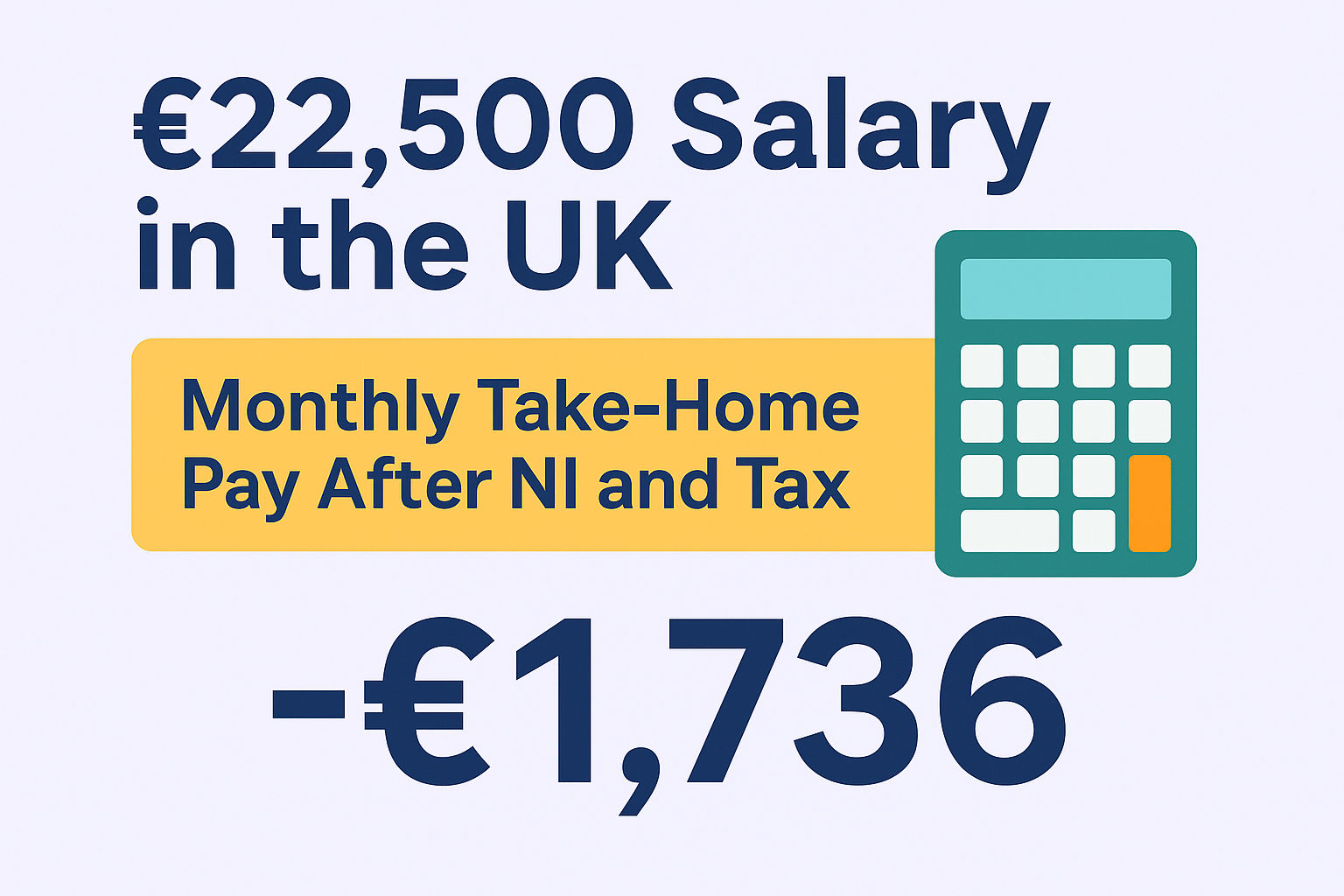
£22,500 Salary in the UK: Monthly Take-Home Pay After NI and Tax
If you’re earning £22,500 per year in the UK, it’s important to understand how much of that actually ends up in your pocket each month. Between income tax and National Insurance, your take-home pay can be significantly lower than your gross salary. In this guide, we break down your 2025 payslip so you can budget confidently.
UK Salary & Tax Breakdown Calculator
If you live in Scotland, income tax is calculated differently.
Rates and thresholds set by Scottish Government.
A common tax code is “1257L” meaning £12,570 tax-free allowance. Check your payslip, P60, or HMRC letter for your correct code.
• Plan 1: Started before September 2012 in England/Wales
• Plan 2: Started after September 2012 in England/Wales
• Plan 4: Scottish students
• Postgraduate Loan: For master’s/PhD courses
Your payslip or SLC account will confirm your plan.
What’s the Take-Home Pay on a £22,500 Salary?
Here’s a breakdown of your estimated deductions and net pay in the 2025/26 tax year:
| Description | Amount (2025) |
|---|---|
| Gross annual salary | £22,500 |
| Income tax | £1,186 |
| National Insurance (NI) | £478 |
| Net annual salary | ~£20,836 |
| Monthly take-home pay | ~£1,736 |
Figures assume the standard tax code (1257L) with no pension contributions or student loan repayments.
Income Tax on £22,500 Salary
As of 2025, you don’t pay tax on the first £12,570 of your income (your personal allowance). That leaves £9,930 subject to basic rate tax at 20%, which works out to roughly £1,186 per year.
There is no higher-rate tax on this salary, as it falls well below the threshold.
National Insurance Contributions
Class 1 National Insurance is paid on income above the primary threshold, which aligns with the personal allowance. You’ll pay 8% on the taxable portion above £12,570 — that’s £9,930 — resulting in about £478 in NI for the year.
Monthly Take-Home Pay
After income tax and National Insurance, your monthly take-home pay on a £22,500 salary would be approximately £1,736. This does not include any additional deductions such as pension contributions or student loan repayments.
If you are auto-enrolled in a workplace pension and contribute the default 5%, your monthly net pay would fall to around £1,643.
What If You Have Pension Contributions?
Here’s how your monthly pay would look with a 5% employee pension contribution:
| Scenario | Monthly Take-Home Pay |
|---|---|
| No pension | ~£1,736 |
| With 5% pension | ~£1,643 |
Pension contributions reduce your taxable income, so while your pay packet is slightly smaller, you’re investing in your future — and getting tax relief at the same time.
Is £22,500 a Good Salary in the UK?
A salary of £22,500 is slightly below the UK’s full-time average, but it can go further in cities with lower living costs, such as Sheffield, Newcastle, or Cardiff. It may be challenging in London or the South East where rent and travel costs are higher.
For part-time roles, graduate jobs, or junior positions, £22,500 can be a reasonable starting point, especially with low expenses or shared living arrangements.
Understanding what you’ll actually take home from a £22,500 salary is crucial for budgeting and financial planning. With around £1,736 per month in your pocket after tax and NI, it’s wise to keep track of deductions, benefits, and optional contributions like pensions.
Want to see how this compares to other salary levels or after deductions like student loans or bonuses? Try our UK salary calculator to tailor your results instantly.

